Complete Solutions to PRACTICE PROBLEMS 5 of chapter ELECTROSTATIC POTENTIAL AND CAPACITANCE of Class 12 book with complete answers and questions
| Class 12 | PHYSICS |
| Chapter | ELECTROSTATIC POTENTIAL AND CAPACITANCE |
| MODERN PUBLICATION | PRACTICE PROBLEMS 5 |
| Number Of Questions | 18 |
| Academic Year | 2023-24 |
Two capacitors of capacitances `4muF` and another two of `5muF` are connected as shown in the given figure (f). Calculate the effective capacitance across points A and B.
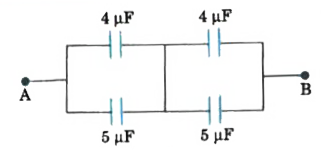
View SolutionThree capacitors of capacitances `2muF, 2muF and 4muF` are connected across a battery of 10V as shown in the adjoining figure (g). Calculate the effective capacitance and charge on each capacitor.
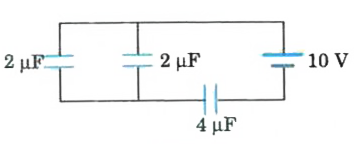
View SolutionCalculate the effective capacitance of the given combination of capacitors between points X and Y as shown in figure (h).
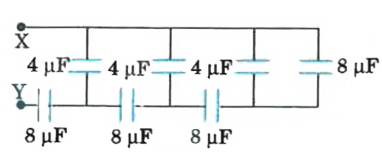
View SolutionTwo capacitors of capacitances `4muF` and `5muF` are connected across a battery of 12 volts as shown in the adjoining figure (i). Calculate the total charge drawn from the battery.
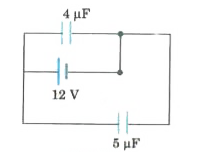
View SolutionA parallel plate capacitor of capacitance `C_(0)` is connected across a battery of voltage V. Calculate the change in energy stored in the capacitor if distance between both the plates is decreased to half of its original value.
View SolutionA 900 pF capacitor is charged by 100V battery.
(a) How much electrostatic energy is strored by the capacitor ? The capacitor is disconnected from the battery and connected to another 900 pF capacitor. How much is the electrostatic energy stored in the system ?
View SolutionTwo parallel plate capacitors of capacitances 2 `muF` and 3 `muF` are connected in series. Calculate the maximum voltage, for the combination if capacitor of capacitance `3muF` can withstand a voltage of 6 kV and capacitor of capacitance `2muF` can withstand a voltage of 7 kV.
View SolutionA flat metallic plate and another cap-shaped metallic plate are placed together to form a capacitor as shown in the adjoining figure. Calculate the capacitance of the combination, if plate separation and area of the plates are as shown in the figure (m).
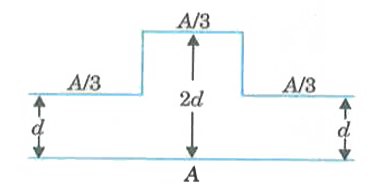
View Solutioncalculate the effective capacitance of the connection if a dielectric material of dielectric constant K is filled in between the plates as shown in the adjoining figure (n).
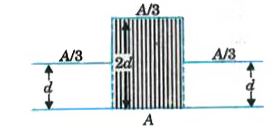
View SolutionFive capacitors are connected across a battery of 5V as shown in figure (o). Calculate the potential difference across the plates of the `5muF` capacitor.
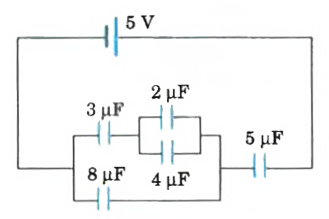
View SolutionThree metal plates P, Q and R of area A are connected across a battery of 2V as shown in the adjoining figure (p). Calculate the net capacitance if separation between plates P and Q is 0.2 cm and is completely filled with dielectric of dielectric constant 4, while separation between plates Q and R is 0.5 cm and is completely filled with a dielectric material of dielectric constant 6.
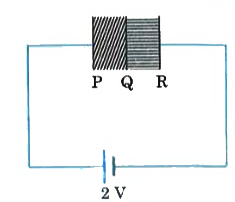
View SolutionFour capacitors of capacitances 2 `muF` and `1muF` are connected across a battery of 10V as shown in the figure (q). Calculate the net capacitance of the combination and net charge across each capacitor.
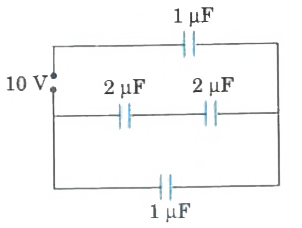
View SolutionTwo parallel plate capacitors of capacitances 1 pF and 2 pF are connected to the batteries of 100 V and 150 V as shown in the figure (r ). Calculate the potential difference across each capacitor.
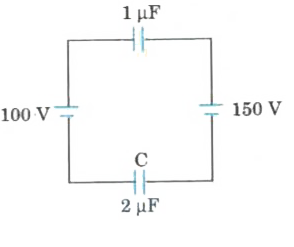
View SolutionCalculate the effective voltage of battery connected across the given circuit, if voltage across the capacitor of capacitance 2C is V volts.
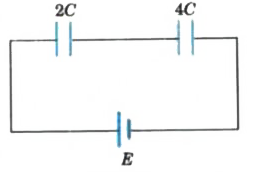
View SolutionTwo capacitors of unknown capacitance are connected in series and parallel. The effective capacitance in series and parallel combination are 4 `muF` to `18muF`, respectively . Find the capacitance of unknown capacitors.
View SolutionThree capacitors of capacitances `2muF, 2muF and 4muF` are connected to a battery of 10V as shown in the figure. Calculate the effective capacitance of the circuit and charge on each capacitor.
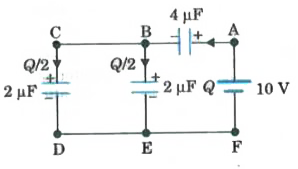
View SolutionA parallel plate capacitor with each plate of dimension `10cm xx 15cm` and a plate separation of 0.2 cm is filled with two slabs of dielectric media as shown in the figure. Calculate the capacitance of the capacitor if `K_(1)=6 and K_(2)=9`.
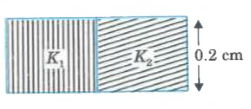
View SolutionThree capacitors of capacitances `5muF, 4muF and 7muF` are connected in different possible combinations. Calculate the minimum and maximum effective capacitance possible from all possible combinations.
View Solution
PRACTICE PROBLEMS 5 questions and complete solutions for chapter ELECTROSTATIC POTENTIAL AND CAPACITANCE of MODERN PUBLISHERS PHYSICS (HINGLISH) of Class 12
All Exercises from MODERN PUBLICATION Class 12 PHYSICS ELECTROSTATIC POTENTIAL AND CAPACITANCE
- Chapter Practice Test
- Competition file (ASSERTION REASON TYPE QUESTIONS)
- Competition file (INTEGER TYPE QUESTIONS)
- Competition file (MATCHING TYPE QUESTIONS)
- Competition file (MATRIX TYPE QUESTIONS)
- Competition file (MULTIPLE CHOICE QUESTIONS based on a given passage/comprehension)
- Competition file (NCERT Exemplar Problems: Multiple Choice Questions Type-I)
- Competition file (NCERT Exemplar Problems: Multiple Choice Questions Type-II)
- Conceptual Questions
- Higher Order Thinking Skills & Advanced Level (QUESTIONS WITH ANSWERS)
- NCERT FILE Solved (Additional Exercises)
- NCERT FILE Solved (Additional Exercises) (Answer carefully)
- NCERT FILE Solved (Additional Exercises) (Answer the following)
- NCERT FILE Solved (Exemplar Problems) (Short Answer Type Questions)
- NCERT FILE Solved (Exemplar Problems) (Very Short Answer Type Questions)
- NCERT FILE Solved (Textbook Exercise)
- PRACTICE PROBLEMS 1
- PRACTICE PROBLEMS 2
- PRACTICE PROBLEMS 3
- PRACTICE PROBLEMS 4
- PRACTICE PROBLEMS 5
- Revision Exercises (Additional Questions)
- Revision Exercises (Fill in the Blanks)
- Revision Exercises (Long Answer Questions)
- Revision Exercises (Numerical Problems)
- Revision Exercises (Short Answer Questions)
- Revision Exercises (Very Short Answer Questions)
- SOLVED EXAMPLES
- Tough & Tricky PROBLEMS